Redeem Your Grounds…Your Coffee Grounds That Is!
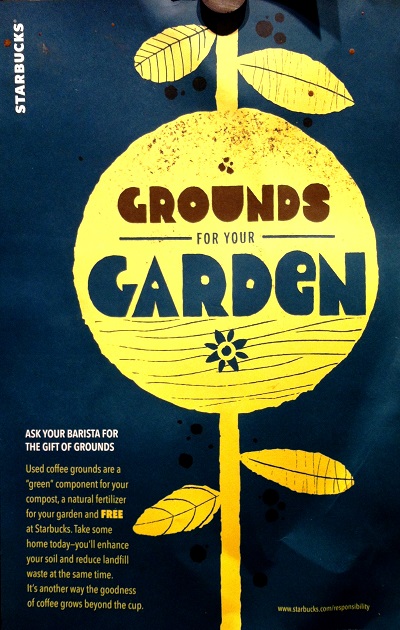 So I was at home writing a post when Britt texted me a pic that she had taken while at Starbucks picking up a morning boost…with the message “What a great idea for a blog post.” Her pic was of a sign promoting Starbucks’ “Grounds for Your Garden” program.
So I was at home writing a post when Britt texted me a pic that she had taken while at Starbucks picking up a morning boost…with the message “What a great idea for a blog post.” Her pic was of a sign promoting Starbucks’ “Grounds for Your Garden” program.
Friends have told me about how they’ve gotten coffee grounds from their local coffee shop…but I had visions of it being more of a covert operation…with an amenable, but non-compliant barista…like a drug deal behind the dempsey dumpster. I had no idea that Starbucks had officially sanctioned such behavior…and it seems for some time now…for several years. How have I missed this?
Anyway, Starbucks’ sign goes on to say… “Used coffee grounds are a ‘green’ component for your compost, a natural fertilizer for your garden and FREE at Starbucks. Take some home today – you’ll enhance your soil and reduce landfill waste at the same time. It’s another way the goodness of coffee grows beyond the cup.”
Since we give all of our food scraps to our chickens…and because I’m not disciplined enough to check on a compost pile (which takes very little discipline, by the way)…I’ve not used my coffee grounds in compost. However, I’ll regularly throw clumps of this rich, brown goodness into my raised beds as a treat for our veggies…and into our landscape beds to make our plants happy and green. And when I say throw, I literally mean throw…which at times requires me to retrieve the coffee filter that slipped through my lazy fingers. I realize that this is probably a sub-optimal use of my coffee grounds…but I thought the benefits of my grounds would eventually get to my plants…and besides, they’re better there than in some landfill…as Starbucks suggests.
But this got me thinking…why are coffee grounds so good for my plants and how do I really make the most of them? With that I asked around a bit and I let my fingers do a little Googlin’…and here’s what I learned.
![]()
Why Are Coffee Grounds Good for Your Garden?
In a nutshell, adding coffee grounds to your soil has 3 primary benefits (besides the whole “being green” thing):
-
- They add nutrients to your soil
- They improve soil texture and drainage
- As mulch they deter pests from munching on your veggies or the tender growth of your perennials (e.g., hostas)
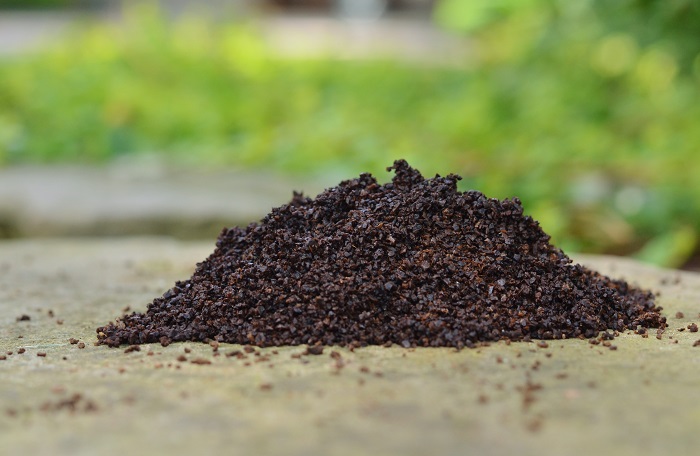
1. Adding Nutrients to Your Soil
Although some claim that coffee grounds increase your soil’s acidity level, it’s my understanding now that they are only slightly acidic and really more neutral than anything else…so they probably don’t do as much as some suggest in altering the pH levels of your soil. However, they do offer other nutrients that your plants benefit from…releasing nitrogen, phosphorus, potassium, and other minerals…all helping support plant growth.
Plants that thrive in a nitrogen-rich growing environment will especially appreciate this caffeinated boost. For example: tomatoes, your green leafy veggies, blueberries, roses, camellias, azaleas, rhodies…err, rhododendrons. However, there are also some plants that really prefer not having a cup morning of joe…so to speak…e.g., asparagus fern, alfalfa, white clover, Chinese mustard, geraniums …and other flowering plants. Coffee grounds actually stunt these plants’ growth and inhibit seed germination. Fortunately for me, I have all the plants that like coffee grounds and none that don’t. Woopwoop!
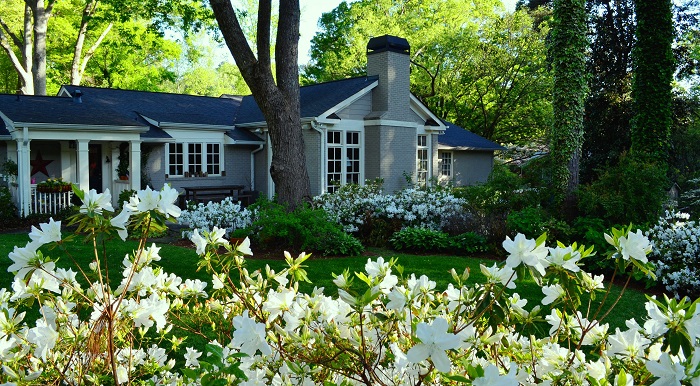
2. Improving Your Soil’s Structure and Drainage
As for improving your soil’s structure and drainage, it’s actually quite simple. Being larger in size than other components in your soil, coffee grounds allow for air and water to flow more easily through your soil and to the roots…allowing the roots to their job of absorption more easily. Coffee grounds will also attract worms…which not only helps the structure and drainage qualities of your soil (as they travel through your soil they’re effectively aerating for you), they’ll also add nutrients by converting organic matter into nutrients through their castings…their manure…their poop. So double-bonus there!
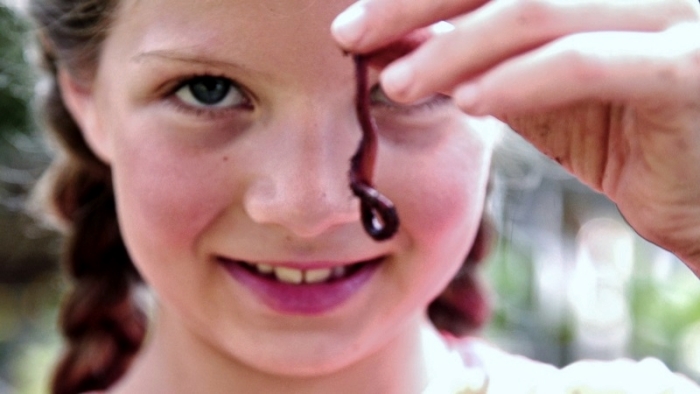
3. Deterring Pests
When using coffee grounds as mulch, your furry pests (e.g., squirrels, chipmunks, and bunnies) don’t want to have much to do with them…so they stay at bay. I’m not certain if it’s the smell or the texture…probably the former. Coffee grounds will also deter slugs…likely because they don’t like the way it feels on their soft underbellies…and some believe they don’t like absorbing the caffeine as they slide on by.
How Do You Make the Most of Your Coffee Grounds?
There are a few ways you can use coffee grounds in your garden:
-
- In compost
- As mulch
- Amended directly into the soil
1. Compost
Again, due to my laziness and the fact that my chickens eat all of the potential food scrap components I’d use in a compost pile…I don’t compost. But if you do, coffee grounds are a great addition to your pile. Consider them to be “green” material (e.g., grass clippings and food scraps) that you mix in with your “brown” material (e.g., dried leaves, straw, and wood chips). You can even throw in your filters as some additional “brown” material…as they will decompose as well. Be careful though…don’t add too much of this rich brown goodness to your pile (i.e., > 25%) or it may throw off the overall balance of things.
2. Mulch
As I mentioned above, coffee grounds can be used as mulch. Simply pile ½-1” of coffee grounds around your plants…but not more than that, otherwise you might be left with a moldy pile of yuck. But a mound this deep will fairly quickly be broken down by the rain, worms, and soil microbes. And again, adding them to the top of your soil in this fashion will also deter those nasty slugs.
3. Soil Amendment
For all the reasons I mentioned above, coffee grounds can be amended directly into your soil. You can do that either when you initially put your plants into the ground or by simply scratching it into the soil rather than piling it up as mulch. Your plants will thank you for the easier access to the coffee grounds’ richness.
This is what I’ll probably do. But more than likely…even after all of this new knowledge, you’ll probably still find me throwing my coffee grounds willy-nilly during my morning strolls in the garden. And if the filter flies into my beds, so be it…as long as you can’t see it that easily, I may just leave it there.
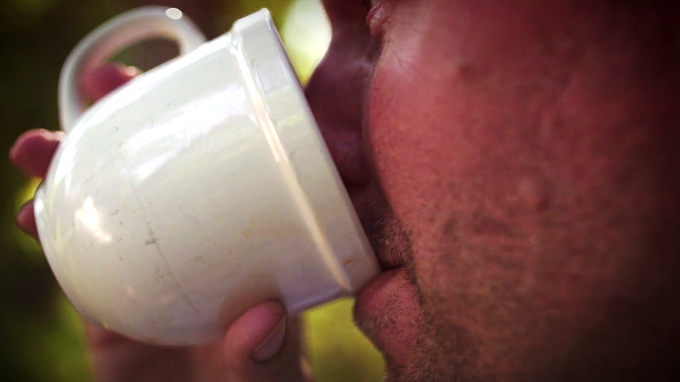
![]()
 So for you coffee lovers, here’s a reason to love your coffee even more…for giving your plants a different kind of boost than it gives you. And now…the next time you order your half-cafe, double, Grande, 2 pump vanilla, non-fat, extra-hot, Latte…ask for a bunch of coffee grounds on the side. And if you don’t like coffee…go ahead, swing into your local Starbucks with the rest of us and place an order for used coffee grounds. I’m sure your friendly barista will be happy to oblige.
So for you coffee lovers, here’s a reason to love your coffee even more…for giving your plants a different kind of boost than it gives you. And now…the next time you order your half-cafe, double, Grande, 2 pump vanilla, non-fat, extra-hot, Latte…ask for a bunch of coffee grounds on the side. And if you don’t like coffee…go ahead, swing into your local Starbucks with the rest of us and place an order for used coffee grounds. I’m sure your friendly barista will be happy to oblige.
Enjoy,

You may also enjoy these posts from RYG ...
If you're not already subscribed to RYG and want to get periodic updates, links to new posts & other ground redeeming info ... just enter your email address below. Easy as that!




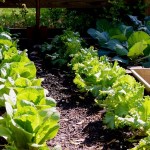

I heard once that flavored coffee grounds are not good for the soil and plants. Have you anything to add to this?
Michael…thanks for your question. I did see a good number of people asking about flavored on different gardening forums. Most folks didn’t have a definitive answer…but those who did said that using flavored coffee grounds is fine. Sorry my response wasn’t more scientific than that, but that’s what I know. Have a nice weekend. Take care, D.
Thanks, Doug, for the quick response. I’m going to use the flavored coffee grounds and if I see anything negative, I’ll be sure to let you know!
Best,
Michael
Very cool…I look forward to hearing the results of your case study. We don’t use flavored coffees (Britt uses flavored cream…when she drinks coffee)…so I’m going to be relying on you to let me know what you find out!
That said, your asking the question got me thinking more about how flavored coffee is made…which may give us some insight into if whatever is used to flavor the coffee bean is harmful or not. What I found out is the flavoring happens right after the beans are roasted and then cooled…and the flavors are made up of both natural and synthetic “flavoring oils”. That said, if you’re a purist…and don’t want anything synthetic put into your ground, you probably won’t want to add flavored coffee grounds into your soil…unless there’s such a thing as an all-natural flavored coffee…only using natural flavoring oils.
Also, in my previous research I found that some folks suggested putting your flavored grounds into your compost pile…and I think to increase the speed in which the flavored coating is composted away. Which is less of a “get the unnatural stuff” out (because it’s still in your compost pile as it would be in your soil…but possibly at lower concentrations) and more of a speed at which the coffee grounds’ beneficial qualities will get to your soil/plants.
Here are some links that I found helpful/interesting:
http://www.madehow.com/Volume-3/Flavored-Coffee-Bean.html
http://beancentral.com/flavored-coffee-101.html
http://breweddaily.com/2011/07/how-is-flavored-coffee-made/
Anyway…I hope this helps.
Take care, D.
I use all flavor coffee grounds. Regular or flavored they go in together. Last year was my first year using them and my garden went crazy. I use my single pods open them up and save the grounds. I also dry egg shells and add them into the grounds. Been saving the above during winter and will dump it in the garden when I till it over in spring.
Thanks Martha. We don’t don’t drink flavored coffee…but I’m sure that those who do would wonder if they could use them in their garden. Thanks for adding your personal insight to the converation!!! And awesome that you’re also saving/drying/tilling in your egg shells. We generally feed our egg shells back to our chickens. My daughters think that’s weird…but it helps them produce eggs with stronger shells…so I’m just fine w weirding them out! Anyway…thanks again for chiming in and I hope you have a great rest of your week. Take care, D.
I believe that tea leaves are said to work just as well as coffee in the
garden soil arena!!! And as I personally think it is much better for us
humans, I would assume it is also as good or better for the garden!!!
It certainly could ‘t hurt! But don’t know if Starbucks Is sharing their
tea leaves as well! Whichever you drink/use, repurposing is the key! I
LOVE IT! Also the idea of natural amendments, back to our roots,
it’s essential to our stability!!
Thanks Brenda…using natural amendments…and repurposing IS key! As far as tea leaves being better than coffee grounds for plants because they’re better for humans isn’t necessarily true…it just all depends on why you’re using them…as they do different things. Check out this link for how you could repurpose both: http://www.mnn.com/lifestyle/recycling/stories/20-ways-to-reuse-coffee-grounds-tea-leaves . Take care, D.
We are regular scroungers for coffee grounds at our local Starbucks. We farm and one of our best crop producers are our blueberries. They are a natural acid lover of the coffee grounds and have been prolific berry producers for several years now. Blessed!
Hey Vicky…thanks for your comment. Although I’ve posted about the Starbucks “Grounds for Your Garden” program…I’ve actually never taken them up on it. But I think I’m going to pay them a visit this weekend and get some to till into my raised beds and to spread around our blueberries! Thanks again Vicky…and take care, D.
[…] image via redeemyourground […]
How do you preserve the grounds over winter months? Do you dry them to prevent mold?
Hey Joan…To be honest, I don’t preserve them over winter…I just keep spreading the rich brown love all year round. That said, We don’t have weeks when there’s standing snow on the ground…not even days…or hours really! So if you needed to store them, yes…you’d have to dry them so that they don’t get moldy. Having never done that, here are a couple of links to posts you might find helpful: https://groundtoground.org/2011/04/17/how-to-dry-and-store-used-coffee-grounds/; http://www.green-talk.com/how-to-store-used-coffee-grounds/.
Thanks for reaching out and chiming in with your question. I hope you have a great rest of your weekend and please reach out again. Take care, D.
I HAVE A LITTLE PATTERN IN KEEPING MY COFFEE GROUNDS TILL SPRING…IN MY UTILITY ROOM…I CUT THE TOP OFF A PLASTIC GALLON MILK CONTAINER … I PUT A PLATE NEXT TO IT… I TAKE THE COFFEE FILTER AND USED COFFEE AND PUT IT ON THE PLATE TO DRY….THE NEXT DAY I TAKE THE USED FILTER AND SET IT IN THE OPENING OF THE MILK JUG LETTING SOME OF THE COFFEE FALL INTO THE JUG….THEN PUT THE NEW USED COFFEE FILTER ON THE PLATE…. THE NEXT DAY I RUB THE OLD DRIED COFFEE FILTER TOGETHER AND LET THE REST OF THE DRIED COFFEE GROUNDS FALL INTO THE JUG.. I FOLD UP THE USED COFFEE FILTER TO FILTER THINGS OR PUT IN THE BOTTOM OF POTS IN THE SPRING AND PUT IT IN A BAGGY ….THEN IT STARTS ALL OVER AGAIN ….TAKING THE DRIED COFFEE FILTER FROM THE PLATE TO THE MILK JUG AND PUT THE NEW USED COFFEE FILTER ON THE PLATE….AND SO ON. HAVEN’T HAD ANY MOLD IN THE JUG YET!!!
Wow…thanks Kelly! That is quite an enterprise you have going on there. Very impressive! Thanks so much for sharing how you over-winter your coffee grounds until spring. I’m sure others will really appreciate hearing how you do it. Thanks again…and here’s to spring!!! – Take care, D.
[…] source: Redeem Your Ground […]
[…] Photo from Redeem Your Ground […]